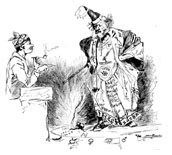
What Today’s Academics Have Forgotten About Education
A TRANSCENDENT CENTER POINT
What once distinguished the gentleman and the lady from their common counterparts was not that the former possessed more worldly goods than the latter, for gentlemen and ladies often were anything but wealthy. What distinguished them was what the gentleman and the lady had, and the common man and woman lacked: a principled education informed by what Chateaubriand called the genius of Christianity, an education that had as its end the realization of a unifying vision of nature and man’s place in it. Granted, gentlemen, once considered the natural leaders of the people, did not always govern justly, but having studied civilization and the moral precepts that make it possible, they at least governed intelligently.
Today, Americans of every social class enjoy a constitutional right to govern themselves. To do so responsibly and with dignity, however, they must be humanely educated. There is “no safe depository of the ultimate powers of society but the people themselves,” wrote Thomas Jefferson, “and if we think them not enlightened enough to exercise control with a wholesome discretion, the remedy is not to take it from them but to inform their discretion by education.” Informing the discretion of the people entails, first and foremost, instructing them in the ways of virtue. Moreover, informing their discretion requires that those who do the instructing remember that the proper object of study by mankind is man, by which unpopular term is meant male and female.
This is, essentially, what many academics have forgotten, particularly at large, secularized universities, where professors are bent on subverting what was once accepted as the true and the good. Unfortunately, academe has largely cut itself loose from all philosophical moorings. Many university professors are committed nominalists who believe, and would have everybody else believe, that universals such as truth, goodness, justice, redemption, and salvation exist in name only, as nothing more than human desiderata; that reality exists in the subjective mind alone; that there are as many universes as there are minds thinking them into existence; that the transcendent and organizing center of language cannot hold because there never was a transcendent center in the first place; and that in the beginning there was nada, and nada was with nada, and nada was nada.
Contrary to the tenets of postmodern eclecticism, some points of view are simply superior to others. This is not to say, of course, that what is true should treat uncharitably what is not. Nor is this to say that one can always be certain of the truth. The teacher who holds that all moral points of view are equal has grown bored with the proper study of man and has forsaken reason, which dictates otherwise. Students under the tutelage of such a one are certain to confuse right with wrong, virtue with vice, good with evil, and authority with force, and to have no fixed axioms by which to orient themselves in the flux of contemporary life.
You May Also Enjoy
John Senior was a noble man who stood against the spirit of the age to remind the world of a better time, and he left those he touched better for his presence.
Public discourse remains limited to material concerns, but what really differentiates human beings is culture, which is founded on religion.
If you want to continue teaching on college campuses, it's best to hold to the politically correct version of the genesis of homosexual orientation.

